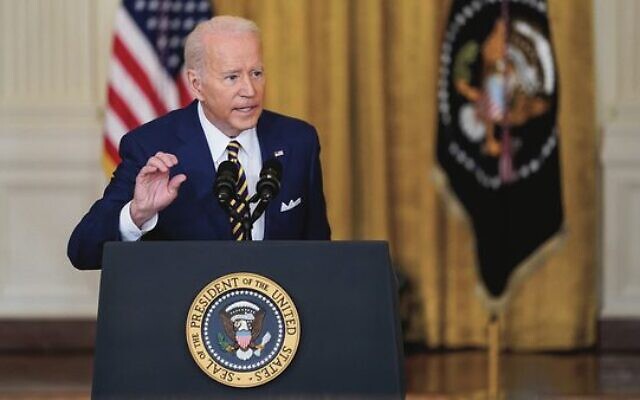Biden mustn’t miss chance to build on Accords
'Windows of opportunity for transforming the Middle East only come along rarely'
It has now been a little more than one year since the Abraham Accords began a dramatic process of opening up the Middle East to increased contact and cooperation between Israel and its Arab neighbours. It began with the normalising of relations between Israel and the UAE, Bahrain, Morocco, and Sudan, but the momentum that has been generated is quite exciting. But dramatic initiatives like this need to be nurtured if they are to grow. And this is not happening yet in the Biden administration.
There are probably two reasons for this. First of all, the Abraham Accords were a victory for the Trump administration, and it is understandable that Biden would not want to celebrate his predecessor’s triumphs.
But what is even more of a concern is that the liberal wing of the Democratic Party is anti-Israel. By this I don’t mean that they have some concerns or criticisms of Israel; that would be entirely appropriate. I mean they are truly anti-Israel. As you will remember, the group of four left-wing Democratic representatives known as “the Squad” even succeeded in temporarily blocking funding for the Iron Dome. The mainstream Democratic Party has always supported Israel, but with Democrats holding only a narrow majority in the House, even a small number can have what is essentially a veto on legislative initiatives.
How have the Abraham Accords succeeded? In addition to the normalising of relations – which is a tremendous achievement by itself – the Accords have had a number of significant economic effects. An energy–water agreement has been signed between Israel and the UAE, which means that the UAE will build a solar energy plant in Jordan and sell the energy to Israel, and that Israel agrees to provide Jordan with up to four times the amount of water than it has in the past. In addition, there have been exciting agreements between aerospace and defence industries. The Jerusalem Post reports that in the last year, trade has increased by 222 per cent. And a Rand Corporation analysis suggests that just eliminating trade barriers among these nations could increase economic interaction by $315 billion in the next 10 years.
But beyond all of this, the Accords represent emerging Israeli-Arab alliances to oppose Iranian aggression in the region, which is something that would benefit everyone in the Middle East. In other words, the Accords offer the opportunity to change the balance of regional power, which is why they are opposed by the Islamic Republic.
As Brian Leib, the executive director of Iranian Americans for Liberty, has pointed out, Iran has made opposition to the Abraham Accords a priority: “The more Arab-Israeli ties produce good results, the more people of the region will reject Iran’s malign influence.”
Iran has, among other things, been courting left-wing politicians in the United States. In May 2021, the Iranian American Council gave its Courage Award to Representative Ilhan Omar.
But don’t the Abraham Accords mean that the plight of the Palestinians has been forgotten? Not really. It is true that the Accords reveal a growing number of Arab nations have lost their patience with the Palestinian leadership and no longer believe they need to put the Palestinians before themselves.
But this is not a zero-sum game. Increased cooperation and new ties between Israel and other Arab nations contribute to the dynamism of the region and to lessening tensions that have festered there for many years. And this is good for everyone. If the Palestinian Authority finds a way to banish its own systemic corruption, and if Hamas finds a way to separate itself from Iran, the Palestinian people could become new partners in a fundamentally changed Middle East. And this would only enhance the possibilities for a successful two-state solution to the current conflict.
The big question, of course, is this: will Saudi Arabia join the Accords? Shlomo Maital and Ella Barzani of the Samuel Neaman Institute point out that the initial agreements between Israel and the UAE and Bahrain could not have been achieved without at least the tacit approval of Saudi Arabia. “The participation of the UAE and Bahrain were trial balloons sent up by Riyadh.”
This means that Saudi Arabia is taking a “wait and see” approach to the Accords. The United States could play a major role in convincing Saudi Arabia to join them.
Windows of opportunity for transforming the Middle East only come along rarely. The Abraham Accords offer one of those very unusual moments in history when good things are possible. It is not enough for the Biden administration to pay lukewarm tribute to the Abraham Accords. It must embrace them and look for ways to expand and deepen them.
A more peaceful and prosperous Middle East is better for Israel, its Arab neighbours, the Palestinians, and the United States. We must not let this opportunity slip away.
Solomon D Stevens has a PhD in political science and has published two books and a number of scholarly articles.


comments